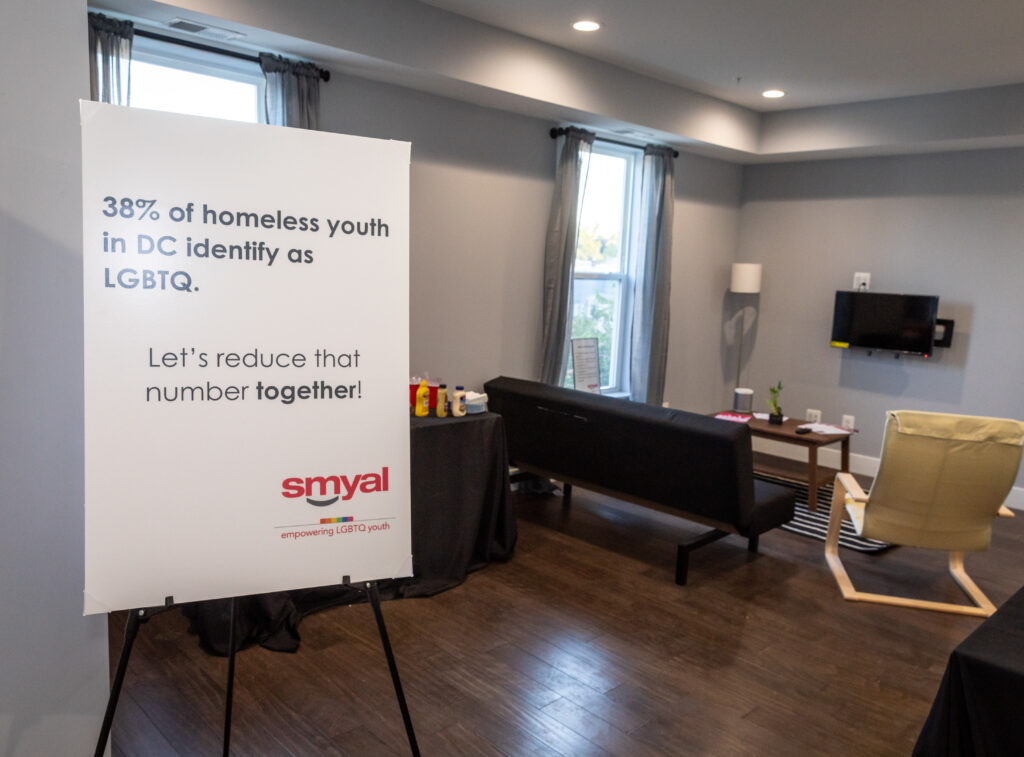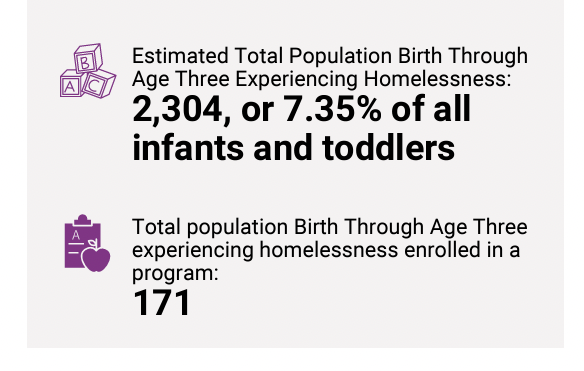When the rest of her family moved away from D.C. due to mental health challenges last year, Harmony was left in the city unhoused. “I’d say I was a tree without roots,” she said at SMYAL’s 23rd annual brunch, held virtually this year on Oct. 11. “I just needed to find real support and I needed to find it quickly. I needed to find a place where I could rest my head and my mind.”
That place, it turned out, would be one of SMYAL’s two youth houses in the District area for LGTBQ+ youth in need of transitional living. The first one, which opened in January 2017, houses 12 youth for two years each. Following its success, SMYAL (Supporting and Mentoring Youth Advocates and Leaders) opened a second house last August, which serves 14 people. These transitional housing programs, which are the largest of their kind on the east coast with the exception of New York City, build on the resources SMYAL has offered since its inception in 1984, including support for LGBTQ+ youth in education, health, and advocacy work.
“With who you are, we will embrace all of that and help you move forward working through that and get to a path of sustainable independence,” said Jorge Membreño, director of youth housing and clinical services, in an interview.
SMYAL was inspired to start the program because of the high proportion of youth experiencing homelessness who identify as LGBTQ+—nearly 40% according to the most recent count. LGBTQ+ youth-specific housing programs exist in the District, Membreño said, to provide a safer space for youth where staff are cognizant of the impact of past trauma.
“We decided a few years ago it would be beneficial to start a program that number one provided an affirming space for our youth,” he said. While all housing programs in the District are required to be “culturally competent” when it comes to LGBTQ+ issues, Membreño said this looks often more like tolerance than embracing identities. “We always want to go a step beyond at creating affirming spaces where we celebrate people’s identities,” he added.
SMYAL’s programs provide participants with a bed in an apartment-style furnished living space, which includes a shared bathroom and kitchen. Upon arrival, staff ensure participants have access to essentials, such as food, and, during the COVID-19 pandemic, personal protective equipment and cleaning supplies. SMYAL provides youth with gift cards to pay for groceries, hygiene products and transportation for as long as they stay in the program.
“They start off being able to get back whatever they have lost in the last however long,” Membreño said.
Once those needs are met, they shift to focus on programmatic work on employment, mental health, and access to benefits, including pandemic and unemployment assistance. Participants meet with case managers at least once a week, who can help refer them to long-term services, such as mental health work and creating paths to financial independence for the youth. Though it’s been more difficult to ensure employment and financially stable futures due to high unemployment rates during the COVID-19 pandemic, Membreño acknowledged, SMYAL staff have been working with youth to find creative solutions, including entrepreneurship. Currently, nearly all participants are either employed or enrolled in a training program.
For those who go through the program, it can be a life-changing experience.
Sam, who spoke at the brunch, found SMYAL through their COVID relief fund. (In the early months of COVID-19, SMYAL provided $75,000 in direct cash assistance to over 130 youths.)
At the time, Sam said, their living situation was pretty unstable, they were struggling with their mental health, and had just been released from the hospital. Though they’d been in and out of transitional housing programs before, a gap in housing combined with unemployment meant they were living on the streets.
SMYAL’s housing program changed that. Sam and their cat moved into an apartment with roommates they felt welcomed them and began saving money and working on their mental health. “My cat is so well taken care of here as well and we feel really comfortable and at home here,” they said. “I’ve been having a lot of little successes.”
The housing program is intended to not just provide temporary protection from homelessness, but to allow residents to build up savings for when they move out. Though Harmony came into the program with anxiety about what it would hold, she said she has flourished, accumulated savings, and raised her credit score.
“SMYAL gave me that awesome opportunity to put my feet in the ground,” she said.
Sam, though they are much newer to the program, has had a similar experience. Free from the threat of eviction for not paying rent, they can put away some of every paycheck to their savings for when they leave SMYAL.
“I have that extra cushion of money that I can save and put towards when I’m out of this program,” they said. “I’m going to want to be financially independent, that’s like my whole goal while being here.”
According to Membreño, these goals are shared by many of the youth. The number one desire, when they enter the program, is to leave with stable housing via a lease, so their rights are protected. After that, they are looking for sustainable employment.
“At the end of that two years they are, fingers crossed, moving on to sustainable independence,” he said.
The program currently has just under 10 graduates, though some participants have transferred out to more other programs based on their needs. The beds are nearly always all full, Membreño said, and while SMYAL and other similar programs in the city try to meet the demand, there is space for more long-term assistance.
“The big push right now is to build more extended transitional housing programs because we know for most youth two years is not enough,” he said, pointing to a model where youth would be housed for six years instead. “If youth come in with trauma, and they’re trying to unpack that trauma while also trying to get employment while also trying to get education certification, it’s a lot to cram into two years.”
In addition to housing programs, SMYAL hosts youth programming, virtual since the pandemic. Through an average of 14 programs weekly, they have had over 850 interactions with youth since March, according to Aldalphie Johnson, the programs director. She highlighted Rise Up, the virtual version of an annual youth organizer conference and training, held this year over Zoom. Over 75 youth from across the nation attended the conference.
“Now more than ever, we have to ensure we are supporting our youth, not just so they can be the change for tomorrow, but so they can be the change for today,” Johnson said at the brunch.
Youth in the housing programs have access to this virtual programming, and also have additional events where SMYAL brings speakers to the houses to speak to them. In January, they were visited by Tim Cook, the CEO of Apple and the most prominent LGBTQ+ CEO in the nation.
“I was impressed to hear him speak about economic obstacles to housing, careers, and opportunities that exist for our community more broadly,” Harmony, who was there for Cook’s visit said.
For Sam, SMYAL’s housing program stands out from similar resources because of the care they give each resident and the staff’s genuine interest in helping them.
“This is unlike any program I’ve ever been in, they’re taking care of us because they want to take care of us. You can tell the difference,” they said. “It really kinds sets a standard for how you expect to be treated as a person.”
Anyone interested in accessing housing services through the DC Coordinated Entry System should call the Youth House office at 202-567-3166 or e-mail [email protected].
You can access general SMYAL services or case navigation by calling their hotline at 202-709-5876 from 11 am-7 pm Monday through Friday.








